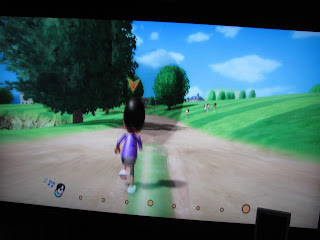Both numbers have increased. Significantly!
My husband and I used to have a gym membership and we'd dutifully go and work out.
This changed when we had children.
(Bringing a baby along was impractical and we didn't want to pay a babysitter so we could exercise.)
My parents bought us a treadmill for us and rain or shine, someone in the family could be found taking a jog in the basement.
This changed when I adopted my skinny pig and he became free-range.
(We were scared he'd run under the machine and skin himself alive.)
My husband and I bought our family a Nintendo Wii and it included a Wii Fit which we used regularly.
This changed when I started to work on my capping paper for my M. Ed.
(I needed the time I was using on the Wii to write this stressful but, in the end, satisfying academic paper.)
Excuses, excuses!
 |
| & I wonder why it's 18 years & 38 pounds! |
Guess what? You can go home again (or in this case, play an old game again). I know it's only been two weeks, but why does this seem to be working?
Not Too Much Guilt but Just Enough Pressure
The Wii Fit game weighs you - but only when you choose to do so. However, when you start a file (or "rejoin" after a while), it does match your home screen size with your test results. All but one member of my family received an "overweight" rating. (The kids decided to join "Family Flab Busters".) It was a little alarming to see a pudgy avatar version of yourself, but you only see it when you first log in. All subsequent activities that use your "image" keep you at "regular" size. The pre-generated dialogue praises you when you log in daily and cheers when you rack up 30 minutes of exercise. It leans more towards the "carrot" rather than the "stick". (I compare this with my husband's use of DuoLingo, which had the adorable owl mascot crying if you didn't visit every 12 hours for a practice session. Darn emotion manipulator!)
Meet-able, Enjoyable Goals
I was worried that I'd never get back on my scoreboard, but the nice thing is that if I match one of my old scores, it will note it as an achievement. Not all the exercises are dependent on your end results or score. I worked on my triceps for a strength exercise, and other tasks that could not use the Wii Balance board or the Wiimote, and it still credited me with the minutes I worked out. And usually it's fun! I get a real sense of accomplishment when I finish a Hula Hoop marathon and my husband still has to laugh when the Soccer Dodge game flings a cleat or panda mask at my head and it hits me.
Family Support and Friendly Competition
My son has been an incredible inspiration for everyone. He wakes up in the morning and immediately does 30 minutes on the Wii. If a nearly 13-year old boy has that kind of determination and perseverance, then I should follow his lead. Sometimes we even watch each other work out until it's our turn (no criticisms allowed). My son really likes to overturn some of the old records we had for certain games (like my boxing prizes) and so we compete with ourselves as well as each other indirectly. The collaboration is the attractive part and once everyone realized that, we even re-added Just Dance to the mix. My kids and I have set a family goal to dance to every single song on the disc and work our way from Just Dance 4 all the way back to the original. It no longer bothers the kids if Mom gets the high score on a song like it did in the past, because we are all having fun together and more often than not, it's now the kids seizing the crown.
I forget what research says is the appropriate amount of time for a habit to be firmly instilled in a routine, but I hope that this renewed interest in exercise, combined with some healthier eating, will help me get trimmed, toned and together! If I can do with while playing a game from the comfort of my own home, then all the better! Who says video games lead to obesity?






